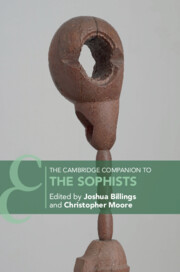Book contents
- The Cambridge Companion to the Sophists
- Other Volumes in the Series of Cambridge Companions
- The Cambridge Companion to the Sophists
- Copyright page
- Contents
- Contributors
- Note on the Text
- Introduction
- Part I Contexts
- Part II Thought
- 5 Nature and Norms
- 6 The Turn to Language
- 7 Problems of Being
- 8 Politics in Theory and Practice
- 9 Interrogating the Gods
- 10 Skills of Argument
- 11 Civic and Anti-Civic Ethics
- Part III Receptions
- Appendix: The People of the Sophistic Period
- Select Bibliography
- Index
- OTHER VOLUMES IN THE SERIES OF CAMBRIDGE COMPANIONS (continued from page ii)
5 - Nature and Norms
from Part II - Thought
Published online by Cambridge University Press: 23 December 2023
- The Cambridge Companion to the Sophists
- Other Volumes in the Series of Cambridge Companions
- The Cambridge Companion to the Sophists
- Copyright page
- Contents
- Contributors
- Note on the Text
- Introduction
- Part I Contexts
- Part II Thought
- 5 Nature and Norms
- 6 The Turn to Language
- 7 Problems of Being
- 8 Politics in Theory and Practice
- 9 Interrogating the Gods
- 10 Skills of Argument
- 11 Civic and Anti-Civic Ethics
- Part III Receptions
- Appendix: The People of the Sophistic Period
- Select Bibliography
- Index
- OTHER VOLUMES IN THE SERIES OF CAMBRIDGE COMPANIONS (continued from page ii)
Summary
The paper examines the origins of the distinction between physis, “nature,” and nomos, “norm,” and the uses made of it during the period of the Sophists. The two terms did not originally lend themselves to being contrasted, but the contrast becomes natural in light of two mid-fifth-century developments: a growing interest in the different customs of different societies and a proliferation of accounts of the origins of human civilization. While the contrast is employed by others, such as Herodotus and the medical writers, it is the Sophists themselves, above all, who exploit it for sociological and philosophical purposes. Some, such as Protagoras, see nomos as building on physis – that is, on tendencies in human nature; others see an opposition between the two, and suggest that we would be better off ignoring nomos and attending to what our natures dictate. The contrast is also applied to religion, which some Sophists treat as nomos.
- Type
- Chapter
- Information
- The Cambridge Companion to the Sophists , pp. 157 - 178Publisher: Cambridge University PressPrint publication year: 2023
- 2
- Cited by

